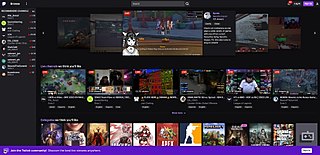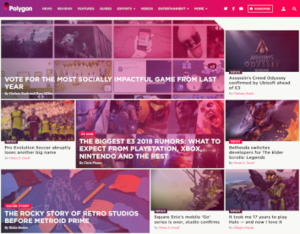
Electronic Gaming Monthly (EGM) is a monthly American video game magazine. It offers video game news, coverage of industry events, interviews with gaming figures, editorial content and product reviews.
Engadget is a technology news, reviews and analysis website offering daily coverage of gadgets, consumer electronics, video games, gaming hardware, apps, social media, streaming, AI, space, robotics, electric vehicles and other potentially consumer-facing technology. The site's content includes short-form news posts, reported features, news analysis, product reviews, buying guides, two weekly video shows, The Engadget Podcast, The Morning After newsletter and a weekly deals newsletter. It has been operated by Yahoo! Inc. since September 2021.

1Up.com was an American entertainment website that focused on video games. Launched in 2003, 1Up.com provided its own original features, news stories, game reviews, and video interviews, and also featured comprehensive PC-focused content. Like a print magazine, 1Up.com also hosted special week-long online cover stories that presented each day a new in-depth feature story, interview with the developers, game screenshot gallery, game video footage, and video of the game studio and creators. On February 21, 2013, Ziff Davis announced it would be winding down the site, along with sister sites GameSpy and UGO.com.

Joystiq was a video gaming blog founded in June 2004 as part of the Weblogs, Inc. family of weblogs, now owned by AOL. It was AOL's primary video game blog, with sister blogs dealing with MMORPG gaming in general and the popular MMORPG World of Warcraft in particular.
NeoGAF is an Internet forum primarily dedicated to the discussion of video games. Founded as an adjunct to a video game news site under the name Gaming-Age Forums, on April 4, 2006 it changed its name to NeoGAF and became independently hosted and administered.
Gamezebo is a website which reports on and reviews video games. Founded in 2005 by Joel Brodie, it was billed as the first website to solely cover casual games and expanded its scope to social games in 2009. After being acquired by the causal game company iWin in 2016, Gamezebo was redesigned and expanded its coverage to PC games. Gamezebo is based in Walnut Creek, California.
GameDaily (GD) was a video game journalism website based in the United States.

Giant Bomb is an American video game website and wiki that includes personality-driven gaming videos, commentary, news, and reviews, created by former GameSpot editors Jeff Gerstmann and Ryan Davis. The website was voted by Time magazine as one of the Top 50 websites of 2011. Originally part of Whiskey Media, the website was acquired by CBS Interactive in March 2012 before being sold to Red Ventures in 2020, then to Fandom in 2022.

Brian Crecente is an American journalist and columnist. He founded Kotaku, co-founded Polygon, previously served as video games editor at Variety, and was in charge of game coverage at Rolling Stone.

VG247 is a video game blog published in the United Kingdom, founded in February 2008 by industry veteran Patrick Garratt. Its current Editor-in-Chief is Dom Peppiatt. In 2009, CNET ranked it as the third best gaming blog in the world.
The Verge is an American technology news website headquartered in Lower Manhattan, New York City and operated by Vox Media. The website publishes news, feature stories, guidebooks, product reviews, consumer electronics news, and podcasts.

James Philip Bankoff is an American media executive who is the co-founder, chairman, and chief executive officer (CEO) of Vox Media. He previously worked for AOL and joined Vox Media's predecessor, SB Nation, in 2009.

Twitch is an American video live-streaming service that focuses on video game live streaming, including broadcasts of esports competitions, in addition to offering music broadcasts, creative content, and "in real life" streams. Twitch is operated by Twitch Interactive, a subsidiary of Amazon. It was introduced in June 2011 as a spin-off of the general-interest streaming platform Justin.tv. Content on the site can be viewed either live or via video on demand. The games shown on Twitch's current homepage are listed according to audience preference and include genres such as real-time strategy games (RTS), fighting games, racing games, and first-person shooters.
Vox Media, Inc. is an American mass media company founded in Washington, D.C. with operational headquarters in Lower Manhattan, New York City. The company was established in November 2011 by CEO Jim Bankoff and Trei Brundrett to encompass SB Nation and The Verge. Bankoff had been the CEO for SB Nation since 2009.

SB Nation is a sports blogging network owned by Vox Media. It was co-founded by Tyler Bleszinski, Markos Moulitsas, and Jerome Armstrong in 2003. The blog from which the network formed was started by Bleszinski as Athletics Nation in 2003, and focused solely on the Oakland Athletics. It has since expanded to cover sports franchises on a national scale, including all Major League Baseball, National Basketball Association, and National Football League teams, as well as college teams, mixed martial arts and professional wrestling, totaling over 300 community sites. In 2011, the network expanded into technology content with The Verge, leading to the parent company Sports Blogs Inc. being rebranded as Vox Media. SB Nation operates from Vox Media's offices in New York City and Washington, D.C.

The Xbox One is a home video game console developed by Microsoft. Announced in May 2013, it is the successor to Xbox 360 and the third console in the Xbox series. It was first released in North America, parts of Europe, Australia, and South America in November 2013 and in Japan, China, and other European countries in September 2014. It is the first Xbox game console to be released in China, specifically in the Shanghai Free-Trade Zone. Microsoft marketed the device as an "all-in-one entertainment system", hence the name "Xbox One". An eighth-generation console, it mainly competed against Sony's PlayStation 4 and Nintendo's Wii U and later the Switch.
Justin Tyler McElroy is an American podcaster, comedian, and former video game journalist. He is known for his work on podcasts and as the co-founder of video game journalism website Polygon.

Vox is an American news and opinion website owned by Vox Media. The website was founded in April 2014 by Ezra Klein, Matt Yglesias, and Melissa Bell, and is noted for its concept of explanatory journalism. Vox's media presence also includes a YouTube channel, several podcasts, and a show presented on Netflix. Vox has been described as left-leaning and progressive.

Martin Troen Moe is an American business executive, and the president of Vox Media. Early in his career, he was an associate at Skadden, Arps, Slate, Meagher & Flom and an adviser to Lawrence Summers, United States Secretary of the Treasury. He later worked for AOL before joining SportsBlogs Inc, which rebranded as Vox Media in 2011. He is credited as a co-founder of the technology news website The Verge. He was the site's publisher, then Vox Media's chief content officer, before being promoted to the role of president.

Griffin Andrew McElroy is an American podcaster, actor, writer, composer, and former video game journalist. He is known for his work on podcasts such as My Brother, My Brother and Me and The Adventure Zone, as well as for co-founding the video game journalism website Polygon.













